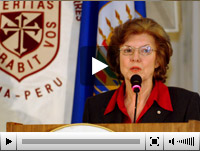- English
Lecture Series
Seventeenth Lecture - Huguette Labelle
Seventeenth Lecture - November 28, 2006
“Beyond Words and Paper: Why the Americas Must Act Against Corruption”
Speaker:
Huguette Labelle, President of Transparency International
Good afternoon. It is a great pleasure to be with you today to address the vital issue of corruption in the Americas. As a citizen of the region myself, it is no surprise that I harbour a strong desire to see the Americas prosper. Reducing the damaging impact of corruption on lives, democracies and economies is critical to the region’s long-term prosperity and stability, and to lifting millions of its citizens out of poverty.
Alternative: first paragraph in Spanish: Buenas tardes. Es un gran placer para mi estar aquí con ustedes hoy para abordar un tema tan importante como es la corrupción en las Américas. Siendo yo misma ciudadana de la región no es de sorprender que tengo un deseo muy profundo de ver a la región prosperar. Reducir el impacto devastante de la corrupción sobre la vida de las personas, las democracias y las economías de la región es esencial para generar prosperidad, estabilidad, y fundamentalmente, aliviar a millones de ciudadanos de la pobreza.
Let me set the stage for my remarks by telling you about my recent trip to Guatemala for the 12th International Anti-Corruption Conference. I found an extraordinarily dedicated and diverse group of individuals there – over 1000 corruption fighters from all walks of life, from 115 countries around the world and from _more than 20 countries in the Americas, united in common purpose.
Six Central American presidents – from Costa Rica, El Salvador, Guatemala, Honduras, Nicaragua and Panama - as well as representatives from Belize and the Dominican Republic, signed the Guatemala Declaration, committing their countries to concrete steps in the fight against corruption and promotion of transparency. This has sent a powerful signal that governments are summoning the political will to give the region’s anti-corruption effort the necessary emphasis and momentum.
Four simple truths emerged from this important conference, and were reinforced by my subsequent visits with the leaders of Panama, Peru and Chile. Countries cannot afford to be complacent about corruption. Expressions of political will, while necessary, are not enough; governments must take concrete actions. A comprehensive approach is required involving the judiciary, parliaments, and the executive working with civil society organizations and the business sector. Most importantly, though, the people must demand accountability from their leaders.
Throughout my travels in the region and beyond, I have witnessed how corruption undermines democracies, distorts economies and traps people in poverty. Corruption does not make a country poorer just by undermining its economy. It makes the poor poorer because part of their meagre earnings, their non-existent disposable income, must pay for basic services that should be free, or to shorten an otherwise long wait for these services.


